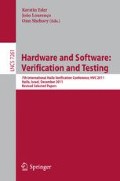Abstract
Finding and fixing concurrency bugs is critical in modern software systems. This talk examines two recent efforts to automate both the detection and the repair of certain types of concurrency bugs using a mixture of static, dynamic, and statistical methods.
First, we present a low-overhead instrumentation framework to diagnose production-run failures caused by concurrency bugs. We track specific thread interleavings at run-time, using sparse random sampling to limit overhead. Methods drawn from work in statistical debugging let us identify strong failure predictors among the sampled concurrent behaviors. Our approach offers a spectrum of performance and diagnosis capabilities suitable for wide deployment to real user desktops.
Second, we describe a strategy for automatically fixing one of the most common types of concurrency bugs in real-world code. Starting with descriptions of bad interleavings, our tool automatically inserts synchronization operations to steer future executions away from danger. Static analyses help us maintain good performance while reducing the risk of deadlocks. Dynamic monitoring allows for run-time recovery from deadlocks that could not be statically avoided.
Overall, our approach yields overheads too low to reliably measure; produces small, simple, understandable patches; and completely eliminates detected bugs in the targeted class across a variety of complex, real-world applications.
Speaker Bio
Ben Liblit is an associate professor in the Computer Sciences Department of the University of Wisconsin–Madison, with research interests in programming languages and software engineering. Professor Liblit worked as a professional software engineer for four years before beginning graduate study. His experience has inspired a research style that emphasizes practical, best-effort solutions that bring formal methods to bear against the ugly complexities of real-world software development.
Professor Liblit completed his Ph.D. in 2004 at UC Berkeley with advisor Alex Aiken. He earned the 2005 ACM Doctoral Dissertation Award for his work on post-deployment statistical debugging, and has received AFOSR Young Investigator and NSF CAREER awards in support of his research.
Access this chapter
Tax calculation will be finalised at checkout
Purchases are for personal use only
Author information
Authors and Affiliations
Editor information
Editors and Affiliations
Rights and permissions
Copyright information
© 2012 Springer-Verlag Berlin Heidelberg
About this paper
Cite this paper
Liblit, B. (2012). Automated Detection and Repair of Concurrency Bugs. In: Eder, K., Lourenço, J., Shehory, O. (eds) Hardware and Software: Verification and Testing. HVC 2011. Lecture Notes in Computer Science, vol 7261. Springer, Berlin, Heidelberg. https://doi.org/10.1007/978-3-642-34188-5_3
Download citation
DOI: https://doi.org/10.1007/978-3-642-34188-5_3
Publisher Name: Springer, Berlin, Heidelberg
Print ISBN: 978-3-642-34187-8
Online ISBN: 978-3-642-34188-5
eBook Packages: Computer ScienceComputer Science (R0)

